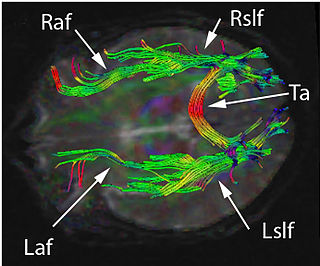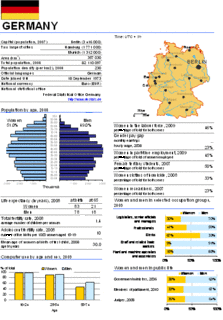
A community is a small or large social unit that has something in common, such as norms, religion, values, or identity. Communities often share a sense of place that is situated in a given geographical area or in virtual space through communication platforms. Durable relations that extend beyond immediate genealogical ties also define a sense of community. People tend to define those social ties as important to their identity, practice, and roles in social institutions. Although communities are usually small relative to personal social ties (micro-level), "community" may also refer to large group affiliations, such as national communities, international communities, and virtual communities.
The International Phonetic Alphabet (IPA) is an alphabetic system of phonetic notation based primarily on the Latin alphabet. It was devised by the International Phonetic Association in the late 19th century as a standardized representation of the sounds of spoken language. The IPA is used by lexicographers, foreign language students and teachers, linguists, speech-language pathologists, singers, actors, constructed language creators and translators.
Phonetics is a branch of linguistics that studies the sounds of human speech, or—in the case of sign languages—the equivalent aspects of sign. It is concerned with the physical properties of speech sounds or signs (phones): their physiological production, acoustic properties, auditory perception, and neurophysiological status. Phonology, on the other hand, is concerned with the abstract, grammatical characterization of systems of sounds or signs.

Non-governmental organizations, nongovernmental organizations, or nongovernment organizations, commonly referred to as NGOs, are usually non-profit and sometimes international organizations independent of governments and international governmental organizations that are active in humanitarian, educational, health care, public policy, social, human rights, environmental, and other areas to effect changes according to their objectives. They are thus a subgroup of all organizations founded by citizens, which include clubs and other associations that provide services, benefits, and premises only to members. Sometimes the term is used as a synonym of "civil society organization" to refer to any association founded by citizens, but this is not how the term is normally used in the media or everyday language, as recorded by major dictionaries. The explanation of the term by NGO.org is ambivalent. It first says an NGO is any non-profit, voluntary citizens' group which is organized on a local, national or international level, but then goes on to restrict the meaning in the sense used by most English speakers and the media: Task-oriented and driven by people with a common interest, NGOs perform a variety of service and humanitarian functions, bring citizen concerns to Governments, advocate and monitor policies and encourage political participation through provision of information.
In geopolitics, a political system defines the process for making official government decisions. It is usually compared to the legal system, economic system, cultural system, and other social systems. However, this is a very simplified view of a much more complex system of categories involving the questions of who should have authority and what the government influence on its people and economy should.

Anomic aphasia is a mild, fluent type of aphasia where an individual has word retrieval failures and cannot express the words they want to say. Anomia is a deficit of expressive language. The most pervasive deficit in the aphasias is anomia. Some level of anomia is seen in all of the aphasias. Individuals with aphasia who display anomia can often describe an object in detail and maybe even use hand gestures to demonstrate how the object is used but cannot find the appropriate word to name the object.
Policy analysis is a technique used in public administration to enable civil servants, activists, and others to examine and evaluate the available options to implement the goals of laws and elected officials. The process is also used in the administration of large organizations with complex policies. It has been defined as the process of "determining which of various policies will achieve a given set of goals in light of the relations between the policies and the goals." Policy analysis can be divided into two major fields:
Single-issue politics involves political campaigning or political support based on one essential policy area or idea.

A crowd is a large group of people that are gathered or considered together. A crowd may be definable through a common purpose or set of emotions, such as at a political rally, a sports event, or during looting, or may simply be made up of many people going about their business in a busy area. The term "the crowd" may sometimes refer to the lower orders of people in general.
Political culture is defined by the International Encyclopedia of the Social Sciences as the "set of attitudes, beliefs and sentiments that give order and meaning to a political process and which provide the underlying assumptions and rules that govern behavior in the political system". It encompasses both the political ideals and operating norms of a polity. Political culture is thus the manifestation of the psychological and subjective dimensions of politics. A political culture is the product of both the history of a political system and the histories of the members. Thus, it is rooted equally in public events and private experience.
Comparative politics is a field in political science, characterized by an empirical approach based on the comparative method. In other words, comparative politics is the study of the domestic politics, political institutions, and conflicts of countries. It often involves comparisons among countries and through time within single countries, emphasizing key patterns of similarity and difference. Arend Lijphart argues that comparative politics does not have a substantive focus in itself, but rather a methodological one: it focuses on "the how but does not specify the what of the analysis." In other words, comparative politics is not defined by the object of its study, but rather by the method it applies to study political phenomena. Peter Mair and Richard Rose advance a slightly different definition, arguing that comparative politics is defined by a combination of a substantive focus on the study of countries' political systems and a method of identifying and explaining similarities and differences between these countries using common concepts. Rose states that, on his definition: "The focus is explicitly or implicitly upon more than one country, thus following familiar political science usage in excluding within-nation comparison. Methodologically, comparison is distinguished by its use of concepts that are applicable in more than one country."
A plural society is defined by Fredrik Barth as a society combining ethnic contrasts: the economic interdependence of those groups, and their ecological specialization. The ecological interdependence, or the lack of competition, between ethnic groups may be based on the different activities in the same region or on long–term occupation of different regions in the Defined by J S Furnivall as a medley of peoples - European, Chinese, Indian and native, who do mix but do not combine. Each group holds by its own religion, its own culture and language, its own ideas and ways. As individuals they meet, but only in the marketplace in buying and selling. There is a plural society, with different sections of the community living side by side, within the same political unit.
Historical institutionalism (HI) is a new institutionalist social science method that uses institutions to find sequences of social, political, economic behavior and change across time. It is a comparative approach to the study of all aspects of human organizations and does so by relying heavily on case studies.
Interest aggregation is the activity in which the political demands of groups and individuals are combined into policy programs, as defined by Almond, Powell, Dalton, and Strom.

Official statistics are statistics published by government agencies or other public bodies such as international organizations as a public good. They provide quantitative or qualitative information on all major areas of citizens' lives, such as economic and social development, living conditions, health, education, and the environment.
A civic culture or civic political culture is a political culture characterized by "acceptance of the authority of the state" and "a belief in participation in civic duties". The term was first used in Gabriel Almond and Sidney Verba's book, The Civic Culture. Civic political culture is a mixture of other political cultures namely parochial, subject and participant political cultures. Almond and Verba characterised Britain as having a civic political culture. In "Is Britain Still a Civic Culture?" Patrick Seyd and Paul Whiteley discuss the extent to which Britain can still be regarded as having a civic political culture. The term civic culture is used to identify the political culture characteristics that explain the stability of a democratic society's political structure.
An advocacy group is a group or an organization which tries to influence the government but does not hold power in the government. Advocacy groups are generally classified according to two broad typologies: their core aims, and their relationship to government.







